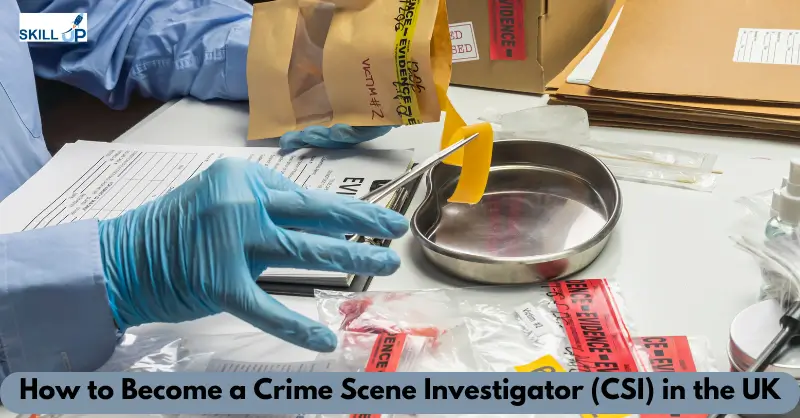
In every crime scene, there’s a mystery. Many undiscovered secrets are waiting to be found, and each clue takes you one step closer to solving the puzzle. Crime scene investigators (CSI) pay close attention to the given clues to solve a crime. Becoming a CSI requires a degree in criminal justice or a relevant field. Once completing formal education, people undergo on-the-job training to gain the knowledge and skills to work in a professional environment. Crime scene investigators must have strong attention to detail, critical thinking abilities and the skills to work under pressure. So, How to Become a Crime Scene Investigator (CSI) in the UK? Let’s dive in.
Table of Contents
What is the Importance of Crime Scene Investigators?
What is a crime scene investigator’s job?
Crime scene investigators (CSIs) play comprehensive roles in solving crimes. They meticulously document the crime scene by taking pictures and physical measurements and collecting forensic evidence. Their careful analysis of information leads to the construction of a final report. For instance, they collect DNA evidence from a crime scene to catch criminals. Without them, many crimes would go unsolved and criminals would escape punishment.
So, how to become a CSI? It requires extensive knowledge and proper training. Many CSIs pursue degrees or take courses in fields like forensic science, criminal justice, or law enforcement. They also undergo specific training in crime scene investigation techniques and procedures.
Moreover, the role of a CSI is not just about knowledge and training. It demands a keen eye for detail and the ability to perform under pressure, making it a unique and challenging career choice. The thrill of solving complex cases and the satisfaction of contributing to justice make this profession exceptionally rewarding.
What Does a Crime Scene Investigator Do?
What do crime scene investigators do?
Crime Scene Investigators play vital roles in solving crimes by collecting and analysing evidence. Let’s take a look at what crime scene investigator jobs in the UK entail:
Arrive at the Scene
When a crime scene occurs, CSIs are called to the scene by law enforcement. They rapidly arrive at the scene to preserve and document crime evidence.
Assess the Scene
What do investigators do at a crime scene? They thoroughly examine the crime area to identify the nature of the crime and potential evidence. From bloodstains to fingerprints and footprints, crime scene assistants note everything.
Document Evidence
Crime scene investigators document every detail of the crime scene using pictures, sketches and notes. The documentation plays a pivotal role in the legal proceedings and helps ensure fairness and justice.
Collect Physical Evidence
DNA evidence is also a crucial component of crime scene investigations. Crime scene investigators gather physical evidence such as DNA samples, weapons, and clothing. Moreover, they employ specialised tools and techniques to ensure the proper preservation of evidence.
Analyse Evidence
After collecting evidence, it is analysed in the laboratory. Several methods, such as fingerprint analysis and DNA testing, are used to identify suspects and link them to the crime.
Write Reports
CSIs create detailed reports of their findings. These reports are later used by investigators, prosecutors, and defence attorneys during criminal trials.
Testify in Court
CSIs are often asked to testify in court about their findings and the evidence they gathered. Their testimony helps jurors identify the significance of the evidence.
So, how to become a forensic investigator? With strong dedication and the proper training, anyone interested in forensic science CSI can pursue a rewarding career as a crime scene investigator. Learn more about how to become a CSI.
Education is no longer a one-time event; it's a lifelong journey. As industries shift and new technologies emerge, professionals who prioritize learning will be the ones who shape the future with skill up. Enhance Your Job Skills with Upto 60% OFF.
What’s the Difference Between a Crime Scene Investigator and a Detective?
Two vital roles spring to mind when investigating crimes: crime scene investigators (CSIs) and crime scene detectives. Although they work collaboratively, their roles vary significantly in terms of focus and responsibility.
Nature of Work
CSIs are in charge of collecting forensic evidence at crime scenes. They gather fingerprints, footprints, blood samples, etc. On the other hand, detectives focus more on analysing gathered evidence, conducting interviews, monitoring records and building cases against suspects.
Fieldwork vs. Analysis
CSIs spend a reasonable amount of time at the crime scene, thoroughly and accurately collecting evidence. Overall, they ensure all evidence is properly collected, recorded and stored. However, detectives work at offices. Again, they scrutinise the evidence collected by CSIs and follow up on leads. Considering different factors, they piece together the sequence of events leading to the crime.
Expertise and Training
How to become a crime scene investigator? A background in forensic science or a related field is required for becoming a CSI, in addition to practical CSI experience. They need specialised training to collect and handle evidence, use different forensic tools, and accurately document crime scenes. Now, if you are wondering how to become a crime scene detective, remember that you need to start as a policeman and gain experience before moving on to investigative roles. Detectives acquire training in investigative techniques, interrogation methods, and legal procedures. SkillUp offers a range of crime scene investigator courses that you can take to level up your skills and earn a comprehensive CSI salary UK.
Focus on Physical Evidence
CSIs prioritise physical evidence found at crime scenes, such as DNAs, fingerprints, fibres, and weapon fragments. They make sure the forensic evidence is collected without contamination and transported safely to the forensic lab for analysis. On the contrary, detectives help identify perpetrators, create motives, and present a compelling case for prosecution. They analyse the gathered evidence, interview witnesses and build a case against suspects based on the collected information.
Collaborative Efforts
Although CSIs and detectives have varied roles, their tasks are interconnected. CSIs provide detectives with the necessary evidence to start the investigation.
Overall, crime scene investigators and detectives play crucial roles in criminal justice. While CSIs collect evidence from crime scenes, detectives analyse that evidence to uncover the secrets behind the crime and identify suspects. Both CSIs and detectives are vital in ensuring justice is served, and perpetrators are held accountable for their actions. Identifying the steps involved in how to become a CSI is paramount.
How to Become a CSI in UK?
For those wondering how to become a CSI in the UK, here’s a comprehensive guide to help you navigate the process:
1. Educational Qualifications
What crime scene investigator qualifications UK do I need?
Obtaining a crime science degree helps you understand the modern complexities of crime, prevention, and control and increases your opportunities for CSI jobs in the UK. You can achieve a degree in a relevant field, such as forensic science, biology, chemistry, or criminal justice. These subjects provide valuable knowledge for CSI work. Moreover, gaining advanced skills can increase your chances of earning a higher crime scene investigator UK salary.
2. Gain Practical Experience
Seek opportunities for internships or work placements with forensic departments, police forces, or laboratories. You can gain hands-on experience through CSI Apprenticeships UK.
3. Develop Key Skills
Becoming a CSI requires observation skills, attention to detail, and the ability to work under pressure. The job also demands meticulousness and accuracy.
4. Physical Fitness
CSI jobs UK require long hours, physical exertion, and exposure to challenging circumstances. As a result, maintaining good physical health is imperative.
5. Apply for Entry-Level Positions
Look for entry-level positions in law enforcement agencies or forensic units. These positions may include crime scene technician or forensic assistant.
6. On-the-Job Training
Once you are hired, you will undergo rigorous on-the-job training your employer provides. This training will demonstrate what is a crime scene investigation. Moreover, it will familiarise you with protocols, procedures, and equipment used in CSI work.
7. Specialise
Improve your crime scene investigation experience by specialising in a specific area of forensic science such as DNA analysis, ballistics, or blood spatter analysis. Specialisation can enhance your CSI experience UK and career prospects.
8. Continuing Education
How do you become a crime scene investigator in the UK? Through continuing education, workshops, and conferences, you can stay updated with the latest advancements in forensic science. You can also take CSI courses from SkillUp, like the Crime Scene Investigators Course, to understand what CSI is, what a crime scene investigator does, and how to become a crime scene investigator in the UK. The course will improve your opportunities for different crime scene assistant jobs.
9. Gain Certification
Although it’s not mandatory, gaining professional certification can demonstrate your competence and dedication to prospective hirers. Training platforms like SkillUp offer relevant certifications.
10. Network
Good networking can grow your confidence and open doors to CSI career opportunities and connections. You can develop professional networks within the forensic community by attending industry events and connecting with your fellow professionals.
Becoming a CSI in the UK requires a combination of education, crime scene investigation experience, and motivation. By following these steps on how to become a CSI and continually looking for ways to improve, you can develop an exciting and rewarding career in crime scene investigation.
Average Salary for a Crime Scene Investigator in UK
How much do crime scene investigators make?
While considering a career as a Crime Scene Investigator (CSI) in the UK, you might wonder about the crime scene investigator pay rate. The average salary for a CSI in the UK typically ranges from £20,000 to £40,000 annually. However, the crime scene investigator salary UK varies depending on experience, location, and employer.
How to become a Crime Scene Investigator in the UK? To become a CSI, you typically need a degree in forensic science or a related field and practical experience in crime scene investigation. Overall, the career involves gaining relevant skills and CSI qualifications UK, which can be acquired through academic study and on-the-job training. Moreover, gaining experience through internships can improve your career prospects and crime scene examiner salary.
FAQs: How to Become a Crime Scene Investigator (CSI) in the UK
CSI stands for Crime Scene Investigator. A CSI examines crime scenes to collect, document, and preserve physical evidence.
What does a CSI do?
A CSI collects and preserves evidence. They take photographs, sketch crime scenes, and work with law enforcement to piece together what happened during a crime.
CSIs in the UK typically earn between £20,000 and £40,000 per year, depending on experience and location.
In the UK, a crime scene detective typically earns between £30,000 and £50,000 per year, depending on their experience, rank, and location. Senior detectives or those in specialised roles can earn more.
A forensic scientist crime scene investigator analyses evidence from crime scenes in a lab, helping to solve crimes by identifying substances, comparing DNA, and interpreting findings.
Becoming a crime scene investigator requires completing a 2-4-year educational program, along with on-the-job training and certification procedures.
How many CSIs are there in the UK? The number of Crime Scene Investigators (CSIs) in the UK must be specified, as it can vary by police force and region. However, several hundred CSIs are employed across various police forces in the UK, with larger metropolitan areas typically having more CSIs than smaller ones.











